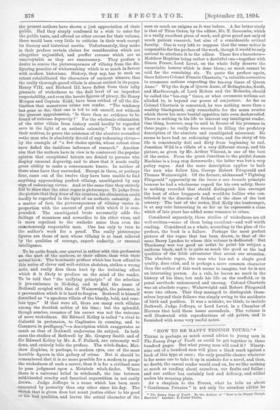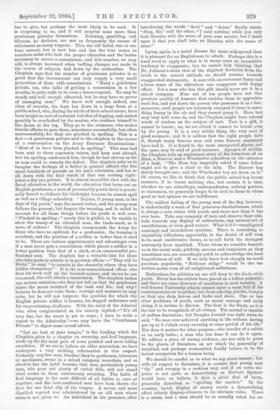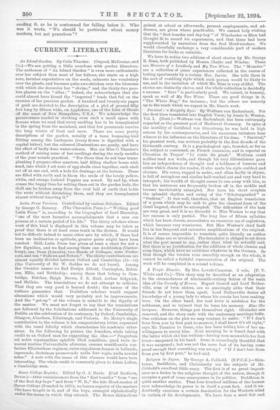" HOW TO BE HAPPY THOUGH YOUNG."
THERE is perhaps as much sound advice to young men in The Sunny Days of Youth as could be got together in three hundred pages. But what young man will read it P Ninety- nine out of a hundred men will place a black mark against a, book of this type at once ; the only possible chance whatever is for some one to take it up in mistake for a novel, and then, no doubt, the casual reader would read on, for we like nothing so much as reading about ourselves, our faults and follies ; and our author has certainly tact and delicacy, and withal makes his meaning plain. As a chaplain to the Forces, what he tells us about " Gentleman Privates " is not only the soundest advice he * T1ie Swrony Dave of Youth, By the Author of " How to be Happy though Married," London T. Fisher Unwin. has to give, but perhaps the most likely to be read. It is surprising to us, and it will surprise none more than gentleman privates themselves. Drinking, gambling, and idleness, he declares, are not so frequently the causes of enlistment as many suppose. This, the old belief, was at one time correct, but is now less and less the true cause, as numbers enlist who lack the proper education and the brains necessary to secure a commission ; and this number, we may add, is always increased when baffling changes are made in the course of subjects laid down by the authorities. The Chaplain says that the number of gentleman privates is so great that the Government can only supply a very small proportion of them with commissions. " Many a gentleman private, too, who talks of getting a commission in a few months, is quite unfit to be even a lance-corporal. He may be steady and well enough educated, but he may have no power of managing men." We know well enough, indeed, one class of recruits, the boys low down in a large form at a public school, who, during the whole of their school career, have been taught no sort of restraint but that of fagging, and cannot possibly be overlooked by the master, who confines himself to the dozen at the top. They go to the crammer, who makes frantic efforts to pass them, sometimes successfully, but often unsuccessfully, for they are plucked in spelling. This is a fact :—A gentleman private said to the chaplain in the course of a conversation on the Army Entrance Examinations " Most of us have been plucked in spelling." This man had been sent to three expensive tutors, had been sent abroad, but his spelling condemned him, though he had striven as far as man could to remedy the defect. The chaplain asks us to imagine the feelings of a father (a general officer) who has spent hundreds of pounds on his son's education, and has to sit down with the final result of that son earning eight- pence a day as a private. It is almost incredible that with the finest education in the world, the education that turns out an English gentleman, a man of presumably gentle birth is practi- cally forced to abdicate his birthright because he cannot spell as well as a village schoolboy. '• Rejoice, 0 young man, in the days of thy youth," says the sacred writer, and the young man follows the precept, but forgets the warning, and is called to account for all these things before his youth is well over. " Plucked in spelling ; " surely this is pitiful, to be unable to show the stamp of an educated man, the trade-mark, as it were, of culture ! The chaplain recommends the Army for those who have no aptitude for a profession; the training is excellent, and the position of a soldier is better than it used to be. There are various appointments and advantages even if a man never gets a commission, which places a soldier in a better position than that of a clerk, or an unsuccessful pro- fessional man. The chaplain has a valuable hint for those who take posts in schools or in garrison offices :—" They will be likely," he says, " to remain in the obscurity where they have hidden themselves." It is the non-commissioned officer who does his work well on the barrack-square, and shows he can command, who will obtain a commission. The chaplain makes one serious omission,—he does not tell us that the gentleman raises the moral standard of the rank and file; and why P because he does not raise them; courage and manners he may raise, but he will not improve the qualities for which the English private soldier is famous, his dogged endurance and his unquestioning obedience. With the story of the Admiral who, when congratulated on his victory, replied,—" It's all very fine, but the worst is yet to come ; I have to write a report to the Admiralty,"—we may leave the " Gentleman Private" to digest some sound advice.
"Let me look at your tongue," is the heading which the Chaplain gives to a chapter on swearing and foul language, made up for the most part of some pointed and most telling anecdotes. If we are to believe an older generation, we have undergone a very striking reformation in this respect. Certainly very few men, whether they be gentlemen, labourers or mechanics, swear in a mixed company nowadays, and so obsolete has the habit become, that men, particularly young men, who pour out plenty of verbal filth, will not stand what seems to them unnecessary swearing. The habit of foul language is the most difficult of all habits to cure or regulate, and the best-conducted men have been shown the door for one fatal slip of the tongue. A severe and most dignified reproof was administered by an old man whose name is not given ns. An individual in his presence, after introducing the words " devil " and "deuce," finally swore. " Stop, Sir," said the other, "I said nothing while you only took liberties with the name of your own master, but I insist upon it that you shall take no liberties with the name of mine."
Lying, again, is a moral disease far more widespread than it is pleasant for an Englishman to admit. Perhaps this is a hard word to apply to what is in many cases an irresistible tendency to exaggerate; but we cannot help thinking that Dr. Johnson's stern view of the slightest deviation from the truth is the correct attitude we should assume towards exaggerated statements. Amen with an exuberant fancy and a keen sense of the ridiculous can exaggerate with happy effect. Yet a man who has this gift should never use it in a mixed company. Nine out of ten people have not that precious quality of humour that enables them to appreciate such fun, and put down the person who possesses it as a liar; moreover, such people are intensely annoyed if there is some- thing funny in the air and they cannot grasp it Here tact may very well come in, and the Chaplain might have uttered words of wisdom on the subject of tact. Tact is a gift, it cannot be learnt ; no, we are afraid it cannot be learnt even by the young. It is a very subtle thing, the very soul of good manners ; and it is seldom that the right people have it, though many famous men and some famous statesmen have had it. It is found in the most unexpected places, and the same may be said of good manners. Apropos of civility, the Chaplain tells an unpleasant story of the behaviour of an Eton, a Harrow, and a Winchester schoolboy on the entrance of a lady. "The Eton boy languidly asked if some fellow ought not to give a chair to the lady. The Harrow boy slowly brought one ; and the Winchester boy sat down on it." Of course, we like to think that the public school-boy learns manners, if he learns nothing else, but certain it is that, whether we are schoolboys, undergraduates, railway porters, or statesmen, we generally forget to be civil to those to whose good or bad opinion we are indifferent.
The saddest failing of the young man of the day, however, is undoubtedly a want of that generous charitableness, which is always a rare virtue with youth, and rarer now than it has ever been. Take any company of men and observe their atti- tude towards any display of enthusiasm, any unusual act of unselfishness, or even good nature. What is it P—unmitigated contempt and incredulous cynicism. There is something so exquisitely ridiculous, apparently, in the denial of self even in its most unobtrusive forms, as to call forth the strongest contumely from mankind. Those whom we consider beneath us in the social scale, pitifully envious and suspicious as they sometimes are, are exceedingly quick to acknowledge the least forgetfulness of self. If we only knew how cheaply we could purchase popularity, " Noblesse oblige " would be the un- written motto even of all enlightened selfishness.
Enthusiasm for athletics no one will deny to the fade-siecle youth. Never has the athlete been placed on a loftier pedestal ; and there are some elements of manliness in such worship. A well-known University athlete cannot enter a room full of his contemporaries at breakfast, but these adoring youths, hungry as they are, drop knives and forks and stare. One or two other problems of youth, such as moral courage and early rising, it is useless to discuss. The first is the finest, as it is the last to be recognised, of all virtues. The second is capable of endless discussion; but Douglas Jerrold was right when he said, " No man ever achieved anything in life without having got up at 6 o'clock every morning at some period of his life." Nor does it matter for what purpose,—the murder of a rabbit or an early bathe ; a man who has done it can do it again. To adduce a piece of strong evidence, one has only to point to the giants of literature, an art which the generality of mankind, and perhaps womankind, fondly believe to be the laziest occupation for a human being.
We should be careful as to what we say about money; but with all respect to Socialists, it is certain that young men " tip " and overpay in a reckless way, and if an extra six- pence is not quite so demoralising as Herbert Spencer would have us believe, it does a great deal of harm, generally described as " spoiling the market." In the country, lavish display of money exerts a demoralising effect utterly disproportionate to its intrinsic value. There is a mean, and a man should be as soundly rated for ex- ceeding it, as he is contemned for falling below it. Who was it wrote, " We should be particular about money matters, but not penurious " ?




































 Previous page
Previous page